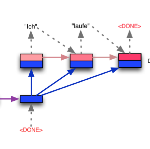Generating and maintaining API documentation with integrity and consistency can be time-consuming and expensive for evolving APIs. To solve this problem, several approaches have been proposed to automatically generate high-quality API documentation based on a combination of knowledge from different web sources. However, current researches are weak in handling unpopular APIs and cannot generate structured API documentation. Hence, in this poster, we propose a hybrid technique(namely \textit{gDoc}) for the automatic generation of structured API documentation. We first present a fine-grained search-based strategy to generate the description for partial API parameters via computing the relevance between various APIs, ensuring the consistency of API documentation. Then, we employ the cross-modal pretraining Seq2Seq model M6 to generate a structured API document for each API, which treats the document generation problem as a translation problem. Finally, we propose a heuristic algorithm to extract practical parameter examples from API request logs. The experiments evaluated on the online system show that this work's approach significantly improves the effectiveness and efficiency of API document generation.
翻译:生成和维护具有完整性和一致性的API文档对于发展中的API来说可能是耗时且昂贵的。为了解决这个问题,已经提出了几种方法来基于不同的网络资源生成高质量的API文档。然而,目前的研究在处理不受欢迎的API方面很弱,并且无法生成结构化的API文档。因此,在本海报中,我们提出了一种混合技术(即 \textit{gDoc}),用于自动生成结构化的API文档。我们首先提出一种细粒度的基于搜索的策略,通过计算各种API之间的相关性为部分API参数生成描述,以确保API文档的一致性。然后,我们采用跨模态预训练Seq2Seq模型M6为每个API生成结构化的API文档,该模型将文档生成问题视为翻译问题。最后,我们提出一种启发式算法,从API请求日志中提取实际的参数示例。在在线系统上进行的实验表明,本文的方法显著提高了API文档生成的效率和效果。




